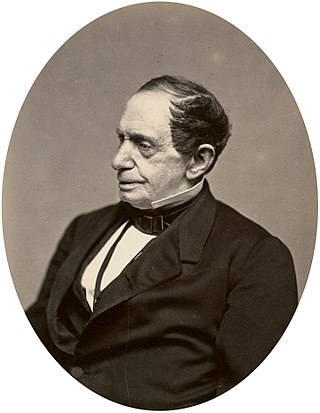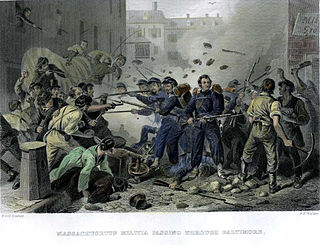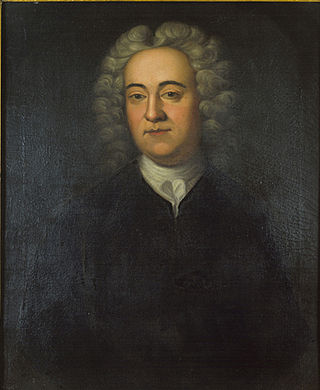
Bloomberg Wall Street Week (WSW), is an investment news and information TV program airing Friday nights on the Bloomberg Television. The original weekly show hosted by Louis Rukeyser aired each Friday evening on PBS in the United States from November 20, 1970 to 2005. The program features a host and guest experts participating in discussions related to the financial markets.

Apopka is a city in Orange County, Florida. The city's population was 54,873 at the 2020 census. It is part of the Orlando–Kissimmee–Sanford Metropolitan Statistical Area. Apopka comes from Seminole word Ahapopka for "potato-eating place".

Johns Hopkins was an American merchant, investor, and philanthropist. Born on a plantation, he left his home to start a career at the age of 17, and settled in Baltimore, Maryland, where he remained for most of his life.

The Baltimore riot of 1861 was a civil conflict on Friday, April 19, 1861, on Pratt Street, in Baltimore, Maryland. It occurred between antiwar "Copperhead" Democrats and other Southern/Confederate sympathizers on one side, and on the other, members of Massachusetts and Pennsylvania state militia regiments en route to the national capital at Washington who had been called up for federal service. The fighting began at the President Street Station, spreading throughout President Street and subsequently to Howard Street, where it ended at the Camden Street Station. The riot produced the first deaths of Union volunteers by hostile action, although caused by civilians, in the American Civil War. Civilians among the attackers also were killed.

Maryland Public Television (MPT) is the Public Broadcasting Service (PBS) member state network for the U.S. state of Maryland. It operates under the auspices of the Maryland Public Broadcasting Commission, an agency of the Maryland state government that holds the licenses for all PBS member stations licensed in the state.

John Work Garrett was an American merchant turned banker who became president of the Baltimore and Ohio Railroad (B&O) in 1858 and led the railroad for nearly three decades. The B&O became one of the most important American railroads by the time Garrett died, and Garret would also become a noted philanthropist. He provided crucial support for the Union cause during the Civil War, expanded the railroad to reach Chicago, Illinois, and competed with the Pennsylvania Railroad for access to New York City.

Peter George Angelos was an American trial lawyer and baseball executive from Baltimore, Maryland. Angelos was the majority owner of the Baltimore Orioles, a team in the American League of Major League Baseball, from 1993 until his death.
Julius Westheimer was a financial advisor from Baltimore, Maryland. He is best known for his radio and television work, having dispensed financial advice on WBAL Radio, WYPR, WMAR, WBAL-TV and PBS' Wall $treet Week, and in columns in the Baltimore Sun, Baltimore Evening Sun, and Daily Record newspapers.

T. Rowe Price Group, Inc. is an American publicly owned global investment management firm that offers funds, subadvisory services, separate account management, and retirement plans and services for individuals, institutions, and financial intermediaries. The firm has assets under management of more than $1.51 trillion and annual revenues of $6.48 billion as of 2023, placing it 537 on the Fortune 1000 list of the largest U.S. companies. Headquartered at 100 East Pratt Street in Baltimore, Maryland, it has 7,868 employees across 17 international offices serving clients in 55 countries.

Louis Richard Rukeyser was an American financial journalist, columnist, and commentator, through print, radio, and television.

During the American Civil War (1861–1865), Maryland, a slave state, was one of the border states, straddling the South and North. Despite some popular support for the cause of the Confederate States of America, Maryland did not secede during the Civil War. Governor Thomas H. Hicks, despite his early sympathies for the South, helped prevent the state from seceding.
Mayo A. Shattuck III is an American businessman and philanthropist. He currently serves as non-executive chairman of Chicago-based Exelon Corporation, co-chair of the Johns Hopkins University Capital Campaign and vice chairman of the board of Johns Hopkins Medicine. Shattuck is involved in a number of philanthropic efforts, including those at the Johns Hopkins University, First Tee, and the University of Maryland Baltimore County and is a notable advocate for nuclear power.

Philip Evan Thomas was the first president of the Baltimore and Ohio Railroad (B&O) from 1827 to 1836. He has been referred to as "The Father of American Railways". The Thomas Viaduct bridge in Relay, Maryland, was named after him.

George Proctor Kane was an American politician and policeman. He is best known for his role as Marshal of Police during the Baltimore riot of 1861 and his subsequent imprisonment at Fort McHenry and Fort Warren without the benefit of habeas corpus. His position as Marshal of Police and his southern sympathies were two of many factors in Abraham Lincoln's decision in February 1861 to pass through Baltimore surreptitiously on his way to Washington to be inaugurated, in order to avoid a possible assassination attempt. Despite his politics, Kane was instrumental in providing protection and an escort for Mary Todd Lincoln on her arrival in Baltimore in February 1861 on her way to the inauguration of her husband, who had preceded her.

Daniel Dulany the Elder (1685–1753) was a prominent lawyer and land-developer in colonial Maryland, who held a number of colonial offices. In 1722 Dulany wrote a pamphlet entitled The Right of the Inhabitants of Maryland, to the Benefit of the English Laws, asserting the rights of Marylanders over the Proprietary Government.

Edward C. Papenfuse is the retired Maryland State Archivist and Commissioner of Land Patents.

Maryland's leading industries by employment are health care and social assistance, state and local government, retail trade, and professional and technical services. Maryland's Gross State Product (GSP) was $295.4 billion in 2010. The Government sector produced $52.1 billion and accounted for 18 percent of Maryland's GSP in 2009. Federal government, including military and civilian, accounted for slightly more than half at just over $27 billion, while state and local government combined for nearly $25 billion. The Fort George G. Meade military installation, which includes employees of the National Security Agency, is the state's biggest employer at 44,540. The largest private sector industry is real estate with $48.4 billion, or 17 percent of economic activity. Large private employers in Maryland include Black & Decker, Legg Mason, Lockheed Martin, Marriott International, ZeniMax Media, McCormick & Company, Perdue Farms, General Motors, IBM, Northrop Grumman, and Verizon.

Kevin J. Manning is the former president of Stevenson University, the former Villa Julie College and the third largest independent university in Maryland. He was inaugurated as the fourth president of Villa Julie College on October 28, 2000, succeeding Carolyn Manuszak. He resigned from Stevenson University on November 29, 2016.
Creig Northrop is an American real estate agent and broker. He is the founder and CEO of Northop Realty, a real estate brokerage.

Ralph D. Semmel is an American engineer and computer scientist. He became the eighth director of the Johns Hopkins University Applied Physics Laboratory (APL) in Laurel, Maryland on July 1, 2010.


















